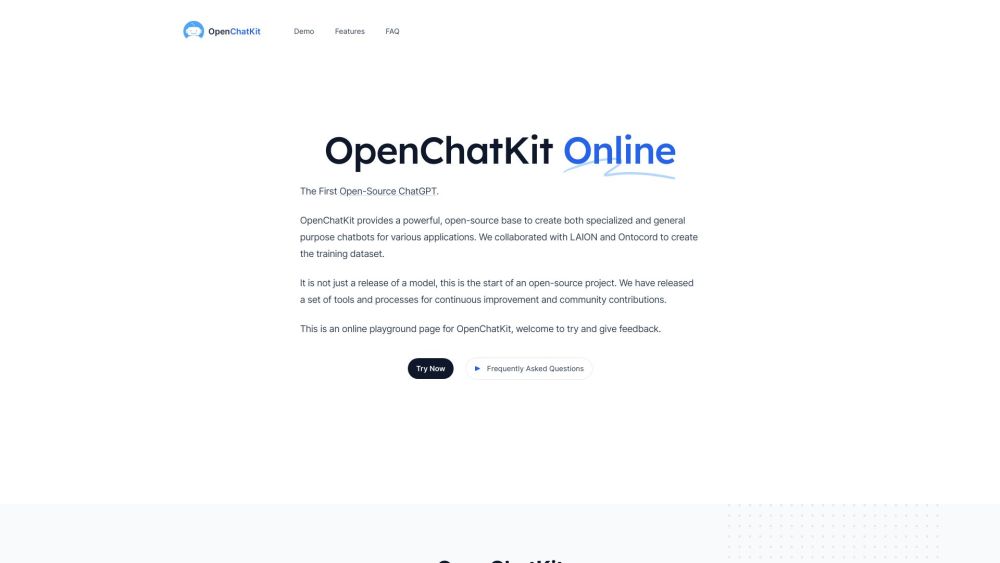OpenChatKit: Versatile Open-Source Project for Specialized Chatbots
OpenChatKit: The ultimate open-source solution for creating specialized and general chatbots, offering flexibility, customization, and top-tier performance.


What is OpenChatKit?
OpenChatKit is an adaptable and open-source framework designed to build both specialized and general-purpose chatbots tailored for various use cases.
How to Get Started with OpenChatKit?
Key Features of OpenChatKit
Instruction-optimized large language model
Handles diverse natural language tasks
Comprehensive dataset
Scalable retrieval system
Continuous source updates
Example code and resources available
Applications of OpenChatKit
Interactive dialogue systems
Efficient question answering
Text classification tasks
Data extraction processes
FAQ about OpenChatKit
What is OpenChatKit?
OpenChatKit is a versatile open-source platform that supports the creation of both specialized and broad-purpose chatbots for various industries and needs.
How to use OpenChatKit?
To use OpenChatKit, start by visiting their website and experimenting with the demo. The source code, model weights, and training data are all available on GitHub for deeper exploration. Engage with the community on GitHub, Discord, Twitter, and Medium for more insights and feedback.
What does OpenChatKit offer?
OpenChatKit offers an instruction-tuned language model, tools for customization, a scalable retrieval system for live data updates, and a moderation model for filtering content. It's designed to be a comprehensive toolkit for building chatbots.
Who are the collaborators on OpenChatKit?
OpenChatKit is a collaborative effort between Together, LAION, and Ontocord. They developed the OIG-43M dataset, which includes millions of high-quality conversational instructions and moderation content.
How can I test OpenChatKit and provide feedback?
Test OpenChatKit on their website and share your feedback via the dedicated app. Join the community discussions on GitHub, Discord, Twitter, and Medium to contribute your ideas and questions.
What is the base model of OpenChatKit and how was it enhanced?
The foundation of OpenChatKit is the GPT-NeoXT-Chat-Base-20B, a 20 billion parameter model derived from EleutherAI’s GPT-NeoX. It’s refined using the OIG-43M dataset to perform well across tasks like dialogue, Q&A, classification, extraction, and summarization.
How does OpenChatKit perform on natural language tasks?
OpenChatKit excels in various natural language processing tasks, particularly in dialogue, Q&A, and classification. However, there are areas for improvement, such as in coding tasks, complex question answering, and creative writing.
How can I reference OpenChatKit in my research?
You can cite OpenChatKit using the BibTeX entries provided in their GitHub repository.
How does OpenChatKit compare to other chatbot platforms?
OpenChatKit stands out for its flexibility, customization options, and extensibility. It performs competitively across a range of tasks and is easily adaptable for specific needs with the available tools.
What is the licensing for OpenChatKit and can I modify it?
OpenChatKit is available under the Apache License 2.0, allowing users to freely modify and distribute the software. The model weights can be inspected and adjusted using tools like Hugging Face Transformers or Jupyter notebooks.
Where can I find the source code, model weights, and datasets?
The source code, model weights, and datasets for OpenChatKit are accessible on GitHub. The weights and datasets are also downloadable via Hugging Face.